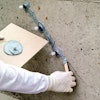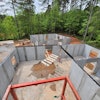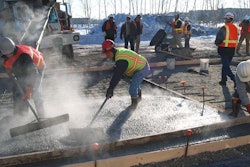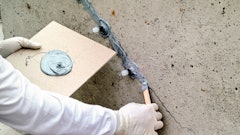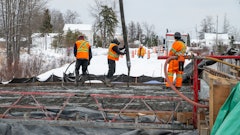Al Engelman of Engelman Construction, Macungie, Pa., will assume the role of president of the Tilt--Up Concrete Association’s board of directors at the association’s annual meeting in January at the World of Concrete.
He is a registered professional engineer and fellow of the American Concrete Institute (ACI). Engelman Construction completes an average of 100 decorative concrete projects each year, as well as approximately 65 other projects including 100,000-- to 1--million-- sq.--ft. warehouses. Engelman also served as president of the American Society of Concrete Contractors (ASCC) from 2001--2002.
How long have you been a member of the construction industry?
For more than 46 years. I graduated from the University of Detroit in 1958 with a degree in engineering. I founded Engelman Construction in 1974 and have continually diversified our firm’s offerings based on our client’s changing needs. For example, we began our precast operation in 1980.
What services does your firm provide?
Our firm provides a wide variety of services including tilt--up, decorative concrete, retaining walls, site work, precast products, foundations, slabs and superflat floors. We have completed residential, municipal and state projects. For the commercial industry, we have completed warehouse and industrial/manufacturing facilities, including sewage treatment plants.
What do you think has been the biggest change in the construction industry?
I have seen several evolutions in the construction industry during the past 46 years. Currently, more projects are moving away from being managed by a general contractor and instead are run by construction managers. Further, design--build is becoming commonplace, when just a few years ago, it was still seen as in its infancy.
What are the biggest challenges plaguing the industry today?
Human relations are a constant challenge. In recent years, it has become increasingly difficult to find qualified project managers. It does not seem that project managers are trained as well as they were in the past. Another challenge is the litigious direction our industry is taking. Contract language is adding more risk for the subcontractor, which makes it critical for us to carefully evaluate the terms of each project.
What suggestions do you have for alleviating these challenges?
I think it is crucial that concrete subcontractors get involved in the prebid process to eliminate some of the challenges that occur during projects. By getting involved early, we could provide our insight and experience to more accurately develop schedules and provide realistic cost estimates. Our knowledge of new technologies and equipment should be considered to provide owners with a cost and materials savings. I believe that it is hard to change processes and estimates if we are not involved in the earliest stage of a project. Further, subcontractors should be included in preconstruction and prepour meetings. We need to encourage attendance by members of all trades to ensure that everyone is aware of their responsibilities. Too often, attendance at these meetings is low because individuals assume that someone else will attend and let them know what they need to do. We need to work to end these assumptions to create a smoother project and increase safety.
What is the most challenging aspect of running a business in this industry?
As a business owner, human resources and safety are the most challenging tasks. Too many people do not have the skills necessary for completing good work. It is important to have properly trained employees to ensure that a jobsite is as safe as possible. Another challenge is the low--bid mentality that currently exists in the marketplace. In the past, your firm was measured on the quality of work that you provided, not just simply the fact that you were the lowest bidder. Further, it is often the contractor’s duty to uncover differences between the structural and architectural drawings. We need all trades to work together to end these blueprint and specification contradictions. This will also help eliminate scheduling difficulties that arise when too many trades are working on a job at the same time.
How do you ensure that your firm maintains dedicated employees?
We are a family--owned business and are committed to providing personal contact with all our employees. We understand the importance of human relations on every job, every day. We conduct daily meetings, including “Toolbox Talks” and huddles to discuss the goals for the day. Communication is extremely important in our firm and everyone participates in creating the vision of our company. We make sure that our expectations are clearly communicated to all team members to ensure that we are all working toward the same goal.
How did you become involved in the ASCC?
I originally became involved with ASCC through the CEO Forum. All of my children have become involved with the business, and we need to learn from others to remain competitive. The ASCC proved to be an excellent forum for learning.
What separates ASCC from other industry associations?
During its early years, the ASCC was viewed as a “good--old--boys” club. However, in recent years, we have recommitted efforts to growing the society and advancing the industry. ASCC does an excellent job of fostering communication between the sponsors that support the society and members. This creates strong relationships and encourages sponsors to stay involved, which helps advance the association.
Why did you become involved with TCA?
Engelman Construction expanded the use of tilt--up in northeast Pennsylvania, and we thought TCA would be an excellent resource for learning more about the method. Today, tilt--up projects comprise 40 percent of our business. We recognized tilt--up as a cost--effective method for warehouse construction and our clients were pleased with the method. TCA helped advance our business.
What are your goals as president of the TCA board of directors?
This past year, the TCA revamped their committee structure and the changes have been very positive. I hope to continue these efforts and increase the roles of the committees. Further, I would like to increase contractor involvement in both committees and on the board of directors. This includes growing the certification program that is offered through TCA in conjunction with ACI. This program adds a level of credibility for contractors, and it is important to continue advancing certification.
Why are you involved in these associations?
I have gained invaluable networking opportunities through both of these associations. It provides a forum for me to contribute my knowledge and experiences, as well as learn from others. Industry involvement has helped grow our company and provided tremendous opportunities for us. As an active member of the construction industry, I hope to help build partnerships and closer working relationships with contractors, engineers and suppliers through realistic expectations, fair contracts and specifications so that this century will be as exciting, progressive and innovative as the last.
What advice would you have for a new construction firm owner?
One of the first steps should be receiving training on the fundamentals of concrete construction. Then, you should develop best business practices. Industry associations like ASCC and TCA can help you with this step. I have learned that you must spend money to make money. And, associations are one of the best places to spend money. Every penny I have spent on associations has been worth the investment. At any given time, I can call a network of more than 300 contractors across the country for advice or help. I have even been able to gain a competitive advantage by learning about firms that I am competing against for a job. I call others who have competed against them in the past to learn more about their firm. Industry associations provide you with an unmatched network of resources that will undoubtedly advance your business.
This is the first article in a year--long series from the Tilt--Up Concrete Association and Concrete Concepts.
To learn more about Engelman Construction, visit www.engelmanconstruction.com or call (610) 967--5677. For more information about the TCA, visit www.tilt-up.org or call (319) 895--6911.

